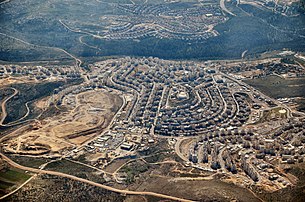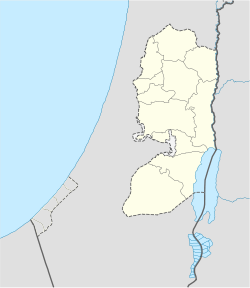
Back موديعين عيليت Arabic موديعين عيليت ARZ Modiín Il·lit Catalan Modiin Ilit CEB Modi'in Ilit Czech Modiʿin Illit German Μοντιίν Ιλίτ Greek Modi'in Illit Spanish Modi'in Illit Basque مودیعین عیلیت Persian
Modi'in Illit
| |
|---|---|
City (from 2008) | |
 | |
| Coordinates: 31°55′50″N 35°2′30″E / 31.93056°N 35.04167°E | |
| Region | West Bank |
| District | Judea and Samaria Area |
| Founded | 1994 |
| Government | |
| • Mayor | Yaakov Gutterman |
| Area | |
| • Total | 4,746 dunams (4.746 km2 or 1.832 sq mi) |
| Population (2022)[1] | |
| • Total | 83,356 |
| • Density | 18,000/km2 (45,000/sq mi) |
| Name meaning | Upper Modi'in |
Modi'in Illit (Hebrew: מוֹדִיעִין עִלִּית; Arabic: موديعين عيليت, lit. "Upper Modi'in") is a Haredi Jewish-Israeli settlement organized as a city council in the West Bank, situated midway between Jerusalem and Tel Aviv.
Built on the land of five Palestinian villages–Ni'lin, Kharbata, Saffa, Bil'in, and Dir Qadis[2]–Modi'in Illit was granted city status by the Israeli government in 2008. The international community has largely viewed Israeli settlements in the West Bank, referred to by Israel as Judea and Samaria, as illegal under international law.[3] However, Israel disputes this interpretation and maintains that settlements are legal and consistent with international law, citing historical, legal, and security reasons. This position has been upheld by successive Israeli governments.[4]
It is located six kilometres (3.7 miles) northeast of Modi'in-Maccabim-Re'ut and is often referred to as Kiryat Sefer (lit. "Book Town"), the name of its first neighborhood, established in 1994. Modi'in Illit also encompasses the neighborhood of Achuzat Brachfeld (Brachfeld Estates). In 2022, it had a total population of 83,356, making it the largest Jewish settlement in the area.[5][6]
- ^ "Regional Statistics". Israel Central Bureau of Statistics. Retrieved 21 March 2024.
- ^ Gadi Algazi (August 2006). "La Cisjordanie, nouveau " Far Est " du capitalisme israélien". Le Monde diplomatique (in French).
Modi'in Illit est une colonie juive importante en Cisjordanie, qui occupe les terres de cinq villages palestiniens : Ni'lin, Kharbata, Saffa, Bil'in et Dir Qadis.
- ^ "The Geneva Convention". BBC News. 10 December 2009. Retrieved 27 November 2010.
- ^ Gregory S. Mahler (2004). Politics and government in Israel: the maturation of a modern state. Rowman & Littlefield. p. 314. ISBN 978-0-7425-1611-3.
- ^ Bronner, Ethan and Kershner, Isabel. Unsettled; In West Bank Settlements, Sign of Hope for a Deal, NY Times, July 26, 2009.
- ^ Cook, 2008, p. 92.
© MMXXIII Rich X Search. We shall prevail. All rights reserved. Rich X Search

